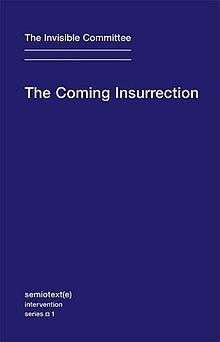The Coming Insurrection
 Cover of the Semiotext(e) edition | |
| Author | The Invisible Committee |
|---|---|
| Original title | L’insurrection Qui Vient |
| Country | France |
| Language | English, translated from French |
| Subject | Politics |
| Publisher | Semiotext(e) |
Publication date | 2008 |
Published in English | 2009 |
| Media type | Print (Paperback) |
| Pages | 136 |
| ISBN | 978-1-58435-080-4 |
| OCLC | 423751089 |
The Coming Insurrection is a French political tract that hypothesizes the "imminent collapse of capitalist culture".[1] It was written by The Invisible Committee, an anonymous group of contributors and first published in 2007 by French company La Fabrique.
Summary
The book is divided into two parts. The first attempts a complete diagnosis of the totality of modern capitalist civilization, moving through what the Invisible Committee identify as the "seven circles" of alienation: "self, social relations, work, the economy, urbanity, the environment, and to close civilization". The latter part of the book begins to offer a prescription for revolutionary struggle based on the formation of communes, or affinity group-style units, in an underground network that will build its forces outside of mainstream politics, and attack in moments of crisis – political, social, environmental – to push towards anti-capitalist revolution. The insurrection envisioned by the Invisible Committee will revolve around "the local appropriation of power by the people, of the physical blocking of the economy and of the annihilation of police forces".
The book points to the late 2000s financial crisis, and environmental degradation as symptoms of capitalism's decline. Also discussed are the Argentine economic crisis (1999-2002) and the piquetero movement which emerged from it, the 2005 riots and 2006 student protests in France, the 2006 Oaxaca protests and the grassroots relief work in New Orleans after Hurricane Katrina as examples of breakdown in the modern social order which can give rise to partial insurrectionary situations.
Influences
A few of the Tarnac 9 were involved in producing Tiqqun, a French radical philosophy journal printed from 1999–2001. Tiqqun was steeped in the tradition of radical French intellectuals that includes Michel Foucault, Georges Bataille, the Situationist International, Gilles Deleuze, and Félix Guattari. The book bears traces of influence from the works of these philosophers, and also, most notably, Giorgio Agamben's notions of the whatever singularity and being-in-common, and Alain Badiou's ontology of the event and truth procedures. Its analysis of capitalist civilization is clearly informed by Foucault's and Agamben's notion of biopower, Guy Debord's society of the spectacle, and Antonio Negri's concept of Empire. The revolutionary strategy outlined in the latter part of the book is reminiscent in some ways of the "exodus" or "secession" strategy espoused by many autonomist Marxists like Antonio Negri and Jacques Camatte, as well as influenced by the concept of war machine in Deleuze and Guattari's works.
Reaction
The book was mentioned in The New York Times[1] and also in the anti-consumerist magazine Adbusters[2] in relation to the case of the Tarnac 9, a group of French leftists arrested on charges of railway sabotage in November 2008. Their alleged authorship of the book is the centerpiece of the government's case. In an interview with The Hollywood Reporter, Michael Moore mentioned the book as being the most recent one he had read.[3]
In September 2010, Coline Struyf from the National Theatre of Belgium adapted the book to theatre.[4]
Glenn Beck, host of The Glenn Beck Program, has at various times referred to the book as, "crazy" and "evil".[5] Beck has also urged his viewers to order the book online themselves, so as to better understand what he claimed were the thoughts of leftist radicals.[6]
In 2014, the Invisible Committee published To Our Friends as a sequel.
References in popular culture
Science fiction author, Jeff VanderMeer writes in the acknowledgements of Acceptance (Southern Reach Trilogy) that The Coming Insurrection served for one of the main character's thinking, "quoted or paraphrased on pages 241, 242, and 336."[7]
See also
- Anarchism in France
- Julien Coupat – activist alleged by French police to be part of the Invisible Committee
- Communization
References
- 1 2 Moynihan, Colin (June 15, 2009), "Liberating Lipsticks and Lattes", The New York Times
- ↑ Nardi, Sarah (July 14, 2009), "The Coming Insurrection, revolutionary movements do not spread by contamination, but by resonance", Adbusters (85), archived from the original on 2015-12-23
- ↑ "Interview with Michael Moore", Hollywood Reporter, archived from the original on August 21, 2009
- ↑ L’insurrection qui vient " Comité invisible " Un atelier dirigé par Coline Struyf (in French), Théâtre National, September 25, 2010
- ↑ Glenn Beck (host) (April 6, 2011). "Breaking the Normalcy Bias". The Glenn Beck Program. New York, United States. Fox News. Retrieved 2011-11-05.
- ↑ The Two Faces of the Tea Party by Matthew Continetti, The Weekly Standard, Vol. 15, No. 39, June 28, 2010
- ↑ VanderMeer, Jeff (2014). Acceptance. New York: Farrar, Straus and Giroux. ISBN 9780374104115.
External links
- The Coming Insurrection — full text (formatted HTML)
- Hallmark, Clayton (July 14, 2009), Two French Books :"Indignez-vous!" ("Time for Outrage") and "The Coming Insurrection" spur revolts A helpful guide to the "circles" in "The Coming Insurrection" (oddly the book uses "circles" instead of chapters).
- Tiqqun and other texts